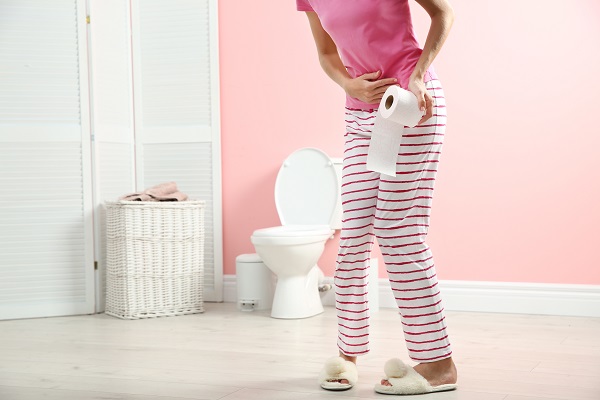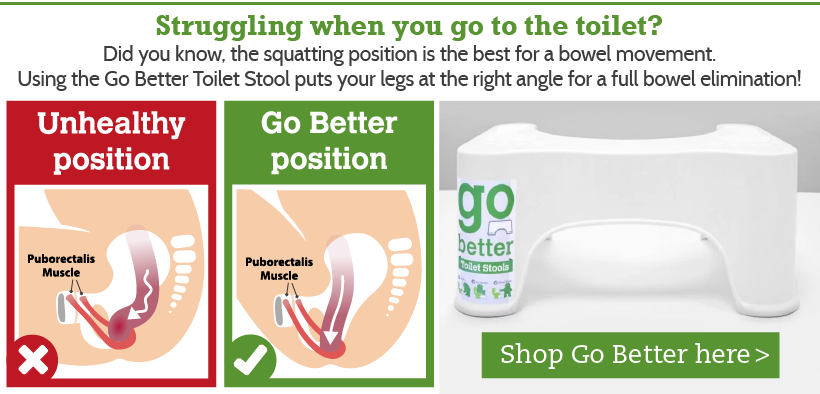

The below blog was written by Registered Dietitian Dalia Maori.
One of the most important things a person can do for their pelvic health is to keep good, regular bowel movements going.
For mothers in particular this can be more than a simple challenge. The combination of having dealt with pregnancy and a vaginal birth, iron deficiency anaemia, irregular eating habits, sleep deprivation and the inability to always respond to the urge to move their bowels can spell real problems with constipation.
Why Do We Get Constipated?
Constipation occurs when too few, or too inadequate bowel movements occur. Stools are often dry and hard and a sensation of incomplete evacuation (there’s more poo left inside which doesn’t seem to want to come out) is common.
Causes of constipation range from poor eating habits and lack of exercise to stress and travel but the bottom line remains the same: constipation is important to solve and it is very important not to strain or your pelvic health can be compromised.
Changing Your Diet to Avoid and Treat Constipation
If you suffer from constipation, it is important to apply the following changes to your diet:
- Fibre is extremely important in ensuring regular, complete bowel movements. However, always increase your fibre gradually or you will find yourself suffering with bloating and gas. Aim to eventually reach the target of 30-40g of fibre per day. Foods rich in fibre include wholegrains, pulses, fruits and vegetables. Leafy vegetables are especially important for maintaining healthy and regular bowel movements.
- Remove caffeinated drinks. They stress the bowel and are diuretics which further dry out the body and hence, the stools. Maintaining excellent hydration, preferably with room temperature or warm drinks such as herbal teas, is key to preventing constipation.
- If you suffer from constipation as a result of iron supplements, ask your doctor or dietitian for more gentle forms of iron. In addition, use prunes soaked overnight, oatbran and ground flaxseeds added to smoothies, yogurts or porridge to help keep the bowels moving. Don’t ignore iron deficiency – it is extremely important to correct it.
- Remember that fibre prevents the absorption of mineral supplements so if you are supplementing iron, calcium or potassium, these take the supplements away from high fibre foods. This goes for thyroid medication as well.
- Aim to guide your body to its healthiest weight by eating a balanced diet of low glycaemic carbohydrates, plant and animal proteins and plenty of fruit and veg. Don’t go on drastic diets to lose weight as these almost always backfire and promote disordered eating. Instead, trust that your body can guide itself to its healthiest weight when you put the right food and movement in and get sufficient rest. A healthy weight is less pressure on the pelvic muscles which will help the bowel to empty itself correctly.
The amount of nutrition information in the media and beyond can often feel very overwhelming – If dietary changes feel overwhelming, make sure you see a registered dietitian for help.
You can find more of Dalia Maori here:
Instagram @daliamaorinutrition
Twitter @DaliaMaoriRD
Website DaliaMaoriNutrition.com
Your Thoughts...
A toilet stool can help you to lift your knees and change your anorectal angle, making it easier to pass stool and lessens the strain on your pelvic floor muscles.

Miss WP - "[The Go Better Toilet Stool] certainly stops my straining and makes 'going' a lot easier. I struggled after the birth of my baby and this is the only thing that helped."
Jay - "[Using the Kegel8 Ultra Vitality meant] less constipation. My muscles feel stronger and my movements more natural. I no longer require that really strong cup of coffee every day in hopes that it will get my bowels moving."






